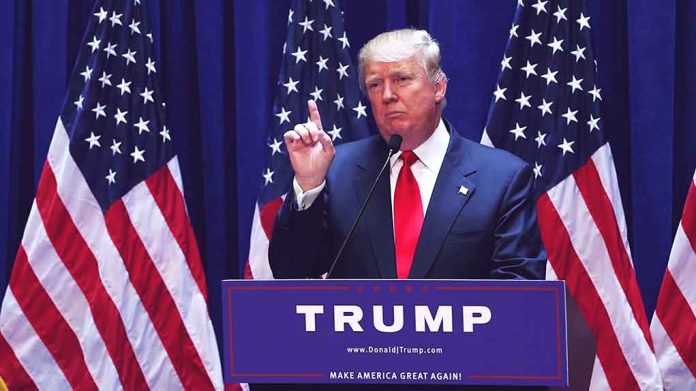
President Trump’s plan to dissolve the Department of Education faces a significant constitutional hurdle, requiring congressional approval and a Senate supermajority.
At a Glance
- Trump proposes closing the Department of Education and returning control to states
- Congressional approval, including a Senate supermajority, is required for dissolution
- The Department oversees $79 billion in education funding and critical programs
- Proposal includes school choice initiatives and merit-based teacher pay
- Rural districts and vulnerable students may face challenges under the plan
Trump’s Vision for Education Reform
President Trump has reignited the debate over federal involvement in education with his bold proposal to dismantle the Department of Education (DOE). This move, aimed at returning educational control to the states, represents a significant shift in federal education policy that has been a longstanding goal for many conservatives.
“One thing I’ll be doing very early in the administration is closing up the Department of Education in Washington, D.C., and sending all education and education work it needs back to the states,” Trump stated, emphasizing his commitment to decentralizing education control.
Constitutional Challenges and Congressional Approval
Despite Trump’s determination, legal experts point out that dissolving a federal department is not a unilateral decision. Andrew Stoltmann, a legal expert, explains, “President Trump does not have the ability to eliminate a federal department. Eliminating it would require congressional action, including a supermajority of 60 votes in the Senate. So, even if Trump can follow through with what he says, he has to pull in some Democrats in the Senate, and that will likely be impossible.”
This constitutional requirement presents a significant hurdle for Trump’s plan, especially given the current political landscape. The necessity for bipartisan support in a deeply divided Congress makes the prospect of dismantling the DOE a challenging endeavor.
Impact on Federal Education Programs
The Department of Education, established in 1979, plays a crucial role in American education. It oversees federal financial aid, data collection, and anti-discrimination efforts in schools, contributing less than 10% to public school funding. The department’s responsibilities include managing the Every Student Succeeds Act, administering the Individuals with Disabilities Education Act, and overseeing federal student loans.
“It would take an act of Congress to take it out. It would take an act of Congress to radically restructure it. And so the question is whether or not there’d be appetite on the Hill for abolishing the department,” states Don Kettl, highlighting the complexity of the situation.
If the department were to be dismantled, its current functions would likely need to be redistributed among other federal agencies, raising questions about the continuity and effectiveness of these critical programs.
Donald Trump aims to abolish the Department of Education, returning control to states. #EducationReform https://t.co/n8NpNsqSFO
— NewsRadio WFLA (@WFLANews) November 13, 2024
School Choice and Reform Initiatives
Central to Trump’s education reform plan is the promotion of school choice initiatives. The proposal includes implementing nationwide universal school choice programs, allowing public education funds to be used for private schooling options. This approach aims to give parents more control over their children’s education but has faced resistance, particularly from rural Republicans who often oppose school choice and voucher programs due to the scarcity of private schools in their districts.
“We want them to run the education of our children because they’ll do a much better job of it. You can’t do worse,” Trump asserted, underscoring his belief in state-level control of education.
Additionally, Trump’s plan includes ending teacher tenure laws and implementing a merit-based pay system for teachers, which could significantly alter the landscape of the teaching profession.
Potential Impacts on Vulnerable Students
Critics of the plan warn that dismantling the DOE could harm the U.S. education system, particularly affecting vulnerable students such as those who are poor, in rural areas, or have disabilities. The department’s role in civil rights enforcement and resource allocation for these students is seen as crucial by many educators and policy experts.
Joshua Cowen, an education policy expert, cautions, “This is a real thing. They really want to do this. It’s more realistic than ever, but I don’t want to overstate the possibility. It’s going to be hard.”
As the debate over the future of the Department of Education continues, the potential impacts on American education remain a topic of intense discussion and concern for educators, policymakers, and families across the nation.
Sources:
- Could Trump actually get rid of the Department of Education?
- Trump would need congressional approval to dissolve Education Department, experts say
- Can Trump dismantle the Department of Education? It won’t be easy, experts say
- Dismantling the Department of Education? Trump’s plan for schools in his second term
- Can Trump Really Dismantle the Department of Education?














